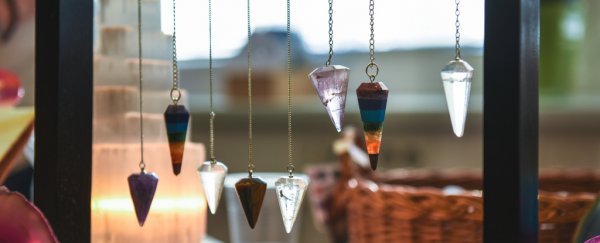Choosing alternative medicine to treat curable cancer instead of conventional cancer treatments more than doubles your risk of dying in five years, according to a new study.
There's no denying that alternative medicine is a hugely popular choice for many Americans, with one in three taking some kind of alternative remedy – but new data shows that rejecting conventional medicine when faced with a cancer diagnosis is an extremely risky gamble.
Researchers from Yale University analysed 10 years of records in the National Cancer Database from 2004 to 2013 and identified 281 patients who had presented with early-stage breast, prostate, lung, or colorectal cancer – but decided to forgo conventional treatments in favour of alternative approaches.
These individuals make up only a small minority of cancer patients overall, but for many, their decision to reject conventional treatments ended up coming at a big cost.
When the researchers compared their survival rates with 560 patients facing the same diagnoses but who opted to receive conventional chemotherapy, surgery, and/or radiation treatments, the individuals who elected to solely take alternative medicine were overall two and a half times more likely to die within five years.
Sobering stats to be sure, but the prospects were even graver in three of the cancer sub-groups.
People taking alternative medicine for breast cancer were 5.68 times more likely to be dead in five years. For colorectal cancer it was 4.57 times, and lung cancer had a factor of 2.17 times.
What brought the overall average down was prostate cancer, for which there wasn't a statistically significant association between alternative medicine and early death – but, as the researchers acknowledge, that's likely because prostate cancer is a slowly progressing disease, whose ultimate long-term impact fell outside the scope of the study.
"We now have evidence to suggest that using alternative medicine in place of proven cancer therapies results in worse survival," says lead researcher and oncologist Skyler Johnson.
"It is our hope that this information can be used by patients and physicians when discussing the impact of cancer treatment decisions on survival."
What drew the researchers to the study was the lack of data examining how effective (or not) alternative approaches were for treating cancer.
The team acknowledges that the research didn't examine which particular alternative medicines were taken by the patients studied – and there's no inference that all alternative approaches are equally effective or ineffective.
"They could be herbs, botanicals, homeopathy, special diets, or energy crystals, which are basically just stones that people believe have healing powers," Johnson explained to Jessica Hamzelou at New Scientist.
The sheer range of alternative treatments on offer is something that needs to be looked at, the team says, because until we know more about what specific alternative medicines people are taking and how it's affecting them, both doctors and patients are in the dark.
It's a tricky area, because while the study shows that on the whole alternative medicines don't seem to be anywhere near as effective at reducing the short-term risk of death in cases of cancer, occasionally traditional medicines are sometimes shown by scientists to contain molecular properties that are hugely helpful at fighting disease.
Sadly, without rigorous scientific testing, it's impossible to know for sure – and it's not always easy for people to differentiate between reliable medical advice and the pervasive pseudoscience that abounds on the internet.
That's especially relevant, given the researchers found that those who elected to take alternative medicine in the study were on the whole younger, with higher income and more education – but despite these advantages, they chose unconventional courses of treatment that mostly didn't work out well for them.
"Anytime we do these types of retrospective studies, we worry about selection bias," one of the team, James Yu told Charles Bankhead at MedPage Today.
"In this study, all the biases were in favour of alternative medicine, in that the cohort was younger, more affluent, and had fewer comorbidities. These patients should be doing better than the standard therapy group, but they're not.
"That's a scary thing to me. These are young patients who could potentially be cured, and they're being sold snake oil by unscrupulous alternative medicine practitioners."
Hopefully, with this new data at hand, it's easier for doctors to help communicate some of the risks surrounding alternative medicines to treat cancer, cutting through misinformation people may have heard from friends or read on the internet.
Because ultimately, of course, the choice is up to them.
"If patients make an informed decision, because of patient autonomy, they can do whatever they want," Yu said.
"We're always advising them; we can't make them do anything."
The findings are reported in the Journal of the National Cancer Institute.
